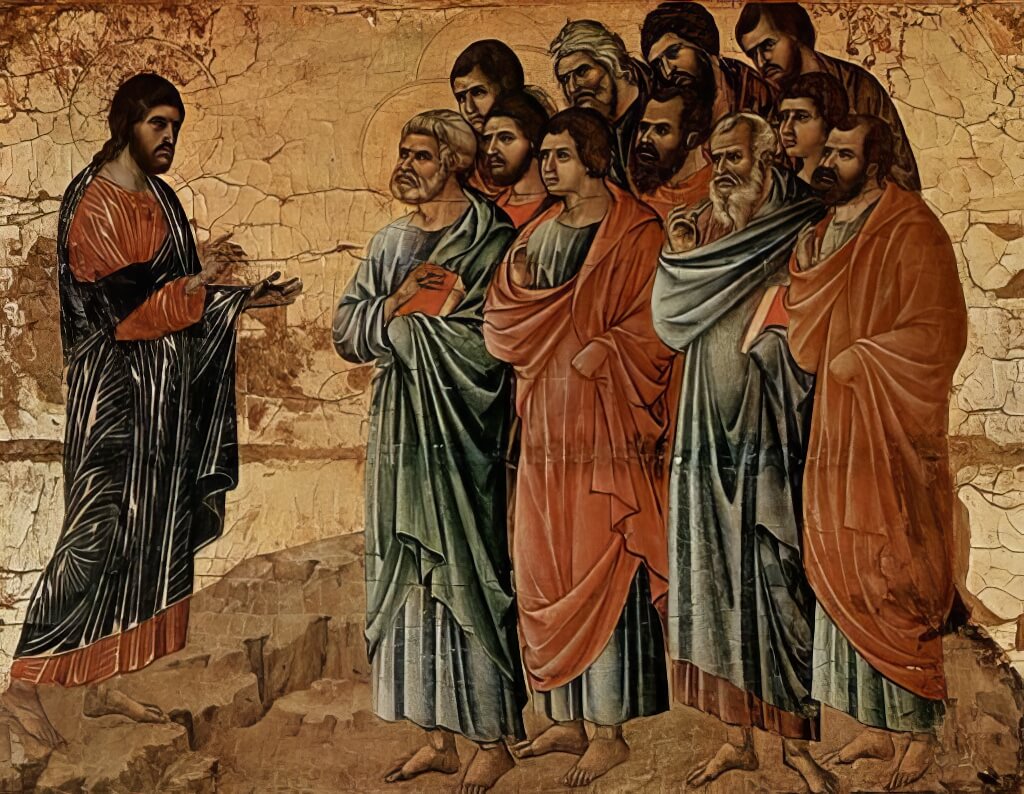Indeed, today so many conversations take place. People talk about politics, economics, food, wars, football, theater performances, concerts, accidents, climate change, and international events. So many words. But little is said about Jesus Christ.
Yet, there is nothing more beautiful than speaking of Christ. Two words in the Holy Gospel are particularly significant: “go” and immediately after that, “teach.” These are words spoken by Jesus Christ Himself. Go and teach in the name of Jesus Christ.

When the Lord completed His earthly ministry, He sent His disciples to continue His work, and there in Galilee, where He appeared to them after the Resurrection, He entrusted them with their mission in these words: “Go therefore and make disciples of all nations, baptizing them in the name of the Father and of the Son and of the Holy Spirit” (Matthew 28:19). “Go,” “teach”—within these words lies the entire mission of proclaiming the Divine Word: the calling to be missionaries.
The goal of missionary work is to lead souls to Christ. It is a call for people to become living members of the Church of the Savior Christ—not followers of someone else, but disciples of Jesus Christ, branches of the Divine Vine. Whenever this is accomplished, it marks the triumph of good over evil and deceit. The first enemy of man is defeated, the heavens rejoice, and the name of God is glorified.
In the New Testament, missionary work is described as being “sent,” a “ministry of the Word,” with expressions such as “I proclaim the Word,” “I preach Christ,” or “I declare the Word of Jesus.” Among the God-bearing Fathers, we find phrases such as “leading to faith,” “serving the calling,” “representing the Gospel,” “sowing the Word,” “good farming,” and “the most rewarding labor.”
Thus, the motivation for missionary work lies in God’s command—in the two words mentioned above—along with a sense of duty and necessity, as expressed by the Apostle Paul in the fundamental principle: “For we cannot but speak the things which we have seen and heard” (Acts 4:20). And further: “Lift up your eyes and look at the fields, for they are already white for harvest” (John 4:35). This means that in many places, both near and far, there are souls ready—ripe—to receive the Divine Word for the salvation of their souls. They have good will and are waiting for laborers for the harvest, for preachers of the Gospel of Christ.
Throughout the history of the Church, many have devoted themselves to the ministry of God’s Word. First, there were the Apostles, followed by the Apostolic Fathers, and then the great God-bearing Fathers—from St. John Chrysostom and St. Photius to the brothers from Thessalonica, Saints Cyril and Methodius, and later to Cosmas of Aetolia during the time of Ottoman oppression. The missionary spirit continued even into the 20th century, with the emergence of outstanding missionaries.

The Church has never ceased to be both pastoral and missionary, continually drawing its missionary spirit from the Holy Gospel, which it places upon the Holy Altar, thereby declaring that the path of mission begins from the Eucharistic assembly, from the Holy Table, from the empty tomb of the Resurrected Christ. Thus, mission in the Orthodox Church is characterized as “ministry after the Divine Liturgy.” It can be no other way.
A Church without Mission is an oxymoron. The Church’s mission is to continue the redemptive work of Christ. Namely: “to preach the gospel to the poor, to heal the brokenhearted, to proclaim liberty to the captives and recovery of sight to the blind, to set at liberty those who are oppressed, to proclaim the acceptable year of the Lord” (Luke 4:18).
The entire missionary endeavor is closely connected to our ecclesial self-awareness. We confess and declare, “I believe in One, Holy, Catholic, and Apostolic Church.” But how well do we understand what this “Catholic” means? It means that the Orthodox Church possesses and preserves the fullness of truth, everything pertaining to the entirety of creation. Just as a Church without liturgical life is incomprehensible, so too is a Church without a missionary life. The Church has open horizons—it is “Christ extended through the ages.” It continues, and must continue, the work of Christ. This is Mission.
However, we must also understand what Mission is not. It is not proselytism, nor propaganda, nor a form of zealous conquest, nor a worldly attempt to increase the number of Church members. It is not about coercion or manipulating another person’s conscience. Mission is the humble proclamation of Divine Revelation, with love for Christ as its foundation, and with full respect for the freedom of others. This is authentic Mission.
Furthermore, we must emphasize that as atheism and new forms of idolatry permeate our societies, the need for re-evangelization and renewed catechism becomes ever more pressing. The duty of mission is a great responsibility—it is the highest and most sacred task. It is a holy mission because the most unfortunate people are those who have never heard of Christ.
But there is something more. Saint James, the Brother of the Lord, reminds us of this in the final two verses of his epistle. He writes very powerfully: “Brethren, if anyone among you wanders from the truth, and someone turns him back, let him know that he who turns a sinner from the error of his way will save a soul from death and cover a multitude of sins” (James 5:19-20).

This means that warm and sincere concern for the return of a wayward brother, who is also our brother in Christ, brings two profound results: a) it will save a soul from death, and b) it will cover many sins. In this way, whoever brings back a sinner from error becomes a co-worker with the Lord, covering not only the sins of the one who has gone astray but also their own. This teaching of Saint James—that the one who engages in missionary work covers a multitude of sins—is echoed by the Apostle Paul in his letter to Timothy: “Take heed to yourself and to the doctrine. Continue in them, for in doing this you will save both yourself and those who hear you” (1 Timothy 4:16).
We also find this truth in the Second Epistle of Clement of Rome (15:1), where it says: “The reward is not small for the one who brings back a lost and straying soul to salvation. For in doing so, you will save both yourself and the one you advise, as this is the reward we have.”
In conclusion, the key is to acquire a missionary mindset. It is indeed a beautiful thing to speak about Christ—wherever and however it is appropriate. Of course, this responsibility primarily belongs to the holy clergy. The bishop bears the ultimate responsibility for all missionary work and preaching. It is only with his blessing that these God-pleasing deeds should be undertaken, ensuring trust and order in what is said and done, in accordance with the sacred canon. As Saint Ignatius the God-bearer writes: “Do nothing without the bishop.”
However, as Saint John Chrysostom teaches, every Christian has a part to play: “I desire,” he says, “that what you hear from my preaching you do not keep only for yourselves, but that you share it with others, so that you might help them spiritually. Indeed,” the holy father continues, “I would like you not only to do this through words, but also through your deeds, leading those around you to grow in the Christian life” (Homilies on Genesis, PG 53:173).
We are all called to bear witness to our faith in Christ, especially in our times. Let us not forget that we Christians are the “light of the world” and the “salt of the earth” (Matthew 5:13-14). We must strive to be a light that never dims and salt that never loses its flavor—a light that is the sweetest for all to see, and salt that is most delightful for all to taste.















